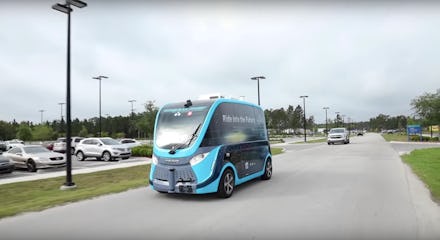The ongoing coronavirus pandemic is putting a huge strain on the medical system in the United States. With already limited staff, it's hard for people to be everywhere at once. Now, the Mayo Clinic is using self-driving cars to ease the burden.
On March 30, the Mayo Clinic in Florida launched its program with four vehicles. The shuttles, which do not have any attendants or people onboard, transfer coronavirus tests and medical supplies from a drive-thru testing site to a processing laboratory on the Mayo Clinic's campus.
The first-of-its-kind program is a result of a partnership with the Jacksonville Transportation Authority (JTA), autonomous vehicle operator Beep, and autonomous vehicle builder Navya.
"This development is a historic moment for the Jacksonville Transportation Authority," Nathaniel P. Ford, Sr., CEO of Jacksonville Transportation Authority said in a press release. "Our innovative team saw this as an opportunity to use technology to respond to this crisis in Northeast Florida and increase the safety of COVID-19 testing."
In a video uploaded by the Mayo Clinic, the shuttle is tailed by a human-operated SUV. Beep's CEO Joe Moye told The Verge that the JTA provides the SUVs to "ensure no traffic or pedestrians would impact the delivery path of the COVID-19 samples and supplies."
However, as The Verge pointed out, the Mayo Clinic's press release says the routes "are isolated from pedestrians, traffic, and staff." Regardless of why the SUV is necessary, putting self-driving vehicles to work right now is pretty ingenious and has multiple benefits.
"Using artificial intelligence enables us to protect staff from exposure to this contagious virus by using cutting-edge autonomous vehicle technology and frees up staff time that can be dedicated to direct treatment and care for patients," Kent Thielen, M.D., CEO of Mayo Clinic in Florida, said in a press release.
According to CNN, Florida has the sixth most confirmed coronavirus cases in the United States at a little over 14,500. The Mayo Clinic's program could be an inspiration for states with similar numbers such as California and Michigan.
